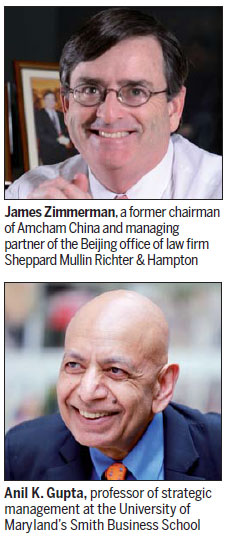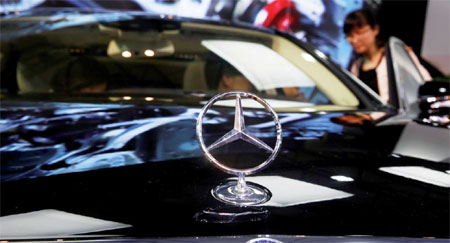Consumer care
Updated: 2014-08-15 10:24
By Andrew Moody and Wang Chao(China Daily Europe)
|
|||||||||||

Antitrust probes are not targeted at foreign firms and will result in fairer prices
Chinese consumers could benefit from lower prices as more than 1,000 companies are being probed by antitrust investigators, a top legal expert says.
Wang Xiaoye, professor at the Institute of Law at the Chinese Academy of Social Sciences in Beijing, who advised the Chinese government on the introduction of anti-monopoly legislation, says the investigations may lead to Chinese consumers being given protection similar to what people that those in Europe and the United States have enjoyed for decades.
"In the development of a market economy in China, anti-monopoly protection has been an area where the law and enforcement has not been strict enough," she says.
"You hear complaints all the time for consumers, and it is important that the agencies enforce the law."
The China headquarters in Shanghai of Mercedes as well as the company's distributors in five cities were raided by authorities on Aug 4.
This followed a similar probe the week before when 100 investigators went into Microsoft's offices in four Chinese cities.
Other companies under investigation include other carmakers Chrysler and Audi as well as 12 Japanese automotive parts makers and US chipmaker Qualcomm.
Many consumer products in China are more expensive than in other markets. Some Apple products, including iPads and iPhones, are often almost 20 percent more expensive in China than they are in Europe or the United States. Many Chinese consumers include such items as "must-buys" when they go abroad.
A Chrysler Jeep 5.7L Grand Cherokee now retails at 800,000 yuan ($129,000), which despite a 50,000-yuan discount following a recent investigation of the company, is still 2.5 times its $50,000 price in the US. Some of the difference is accounted for by China's high import duties.
Automotive parts are a particular area of concern. In many cases consumers are forced to buy parts at high prices through dealerships since independent retailers are not allowed to stock them.
Jiang Liyong, partner at law firm Gaopeng and Partners in Beijing, says the government is now giving high priority to consumer protection.
"The authorities want to ensure the welfare of consumers and has been particularly active not just in these areas but in the financial services and the telecom sectors."
None of the major foreign companies being investigated have commented publicly on their individual cases.
The American Chamber of Commerce in China, or Amcham China, is also yet to issue a statement.
The European Union Chamber of Commerce in China said on Aug 13 that while anti-trust law is "beneficial for developing a healthy market economy in China" it had a number of concerns about the recent moves.
"In some of the industries under investigation, domestic companies have not been targeted for similar violations. Furthermore, in some cases that involve joint ventures, it has only been the foreign partner that has been named as being a party to the investigations."
James Zimmerman, a former chairman of Amcham China and managing partner of the Beijing office of law firm Sheppard Mullin Richter & Hampton, also says the recent moves raise issues for foreign companies operating in China.
"In the event of an investigation it is left for observation whether a foreign company will have any effective judicial remedy to counter a powerful investigating government agency.
"Overall, I am hopeful that in time China will take steps to adhere to the rule of law in anti-monopoly investigations; otherwise, China might be perceived of as a regulatory bully."
Zhou Zhaofeng, counsel at international law firm Taylor Wessing in Beijing and vice-chair of the legal and competition working group of the EU Chamber of Commerce in China, says the test of bias against foreign companies has to be whether actions would be brought under US or EU law.
"If the answer to this is yes then we shouldn't put too much emphasis on any other motives behind these actions," he says.
"From what I have seen from news reports of these cases, particularly in resale price maintenance of auto parts and after sales service (of cars), as someone who studied competition law in Europe, there would be evidence of wrongdoings under EU law also."
Some have suggested that China might be in breach of its World Trade Organization membership obligations in targeting foreign companies under anti-trust law.
But Jiang, who was formerly a Chinese Ministry of Commerce official with the WTO in Geneva, says that this cannot be the case.
"Competition law is actually not included in any WTO obligations to give equal treatment to foreign companies so we can't say that is discriminatory in this regard.
"When you look at the cases brought by the National Development and Reform Commission they are about 50/50 between with foreign and Chinese companies. The number of foreign companies investigated by the other regulatory body SAIC (the State Administration of Industry and Commerce) the numbers are very low."
Anil K. Gupta, professor of strategic management at the University of Maryland's Smith Business School, says it is difficult to see the recent investigations as part of some wider battle between China and the United States.
"There might be some sense of an established and emerging superpower rivalry between China and United States entering into the economic sphere but not in this case.
"A lot of the recent cases involve German companies, and China and Germany generally enjoy an excellent relationship."
Chinese anti-trust legislation, which was largely modeled on EU law, came into force in 2008.
Previously, China had only an unfair-competition law, which related to copying brands and companies bribing customers to build market share. It remains in place.
Some of the most high-profile actions so far have been brought against Chinese companies and not foreign ones.
The one involving the biggest fine was against domestic producers of baijiu, the fiery white alcohol drink that is popular at banquets in China, for insisting that retailers could not sell the drink for less than a minimum price.
In February last year, Kweichow Moutai was fined $40 million (29 million euros), the highest imposed on a single company under the new law so far. Its competitor Wuliangye Yibin was fined $30 million.
Some of the penalties imposed on the foreign companies now under investigation could be higher.
Audi, part of FAW-Volkswagen in China, one of the more high-profile companies being investigated, may be fined 1.8 billion yuan ($292 million, 218 million euros), according to an undisclosed company source quoted in The Economic Observer newspaper in China.
Yet the fines and penalties that have been imposed in China remain a mere fraction of those applied in the EU or in the US.
In March this year, the EU fined two EU and four Japanese companies nearly 1 billion euros for fixing the price of components in the car and truck industry.
In the US, the UK and Ireland, company executives can also be sent to jail and often are because the sanctions are criminal as well as civil.
Tetsuya Kumida, a former executive of a US subsidiary of a Japanese automotive products supplier, was sentenced to prison for 12 months and one day last year. Gary Walker, a former executive in the US of another Japanese auto parts company was sentenced to 14 months in jail last year.
Sebastien Evrard, partner of international law firm Jones Day in Hong Kong, says some of the media coverage of the recent probes has failed to pick up that the Chinese anti-trust regime is not as severe as in other jurisdictions.
"There are no criminal sanctions in China unless you happen to kill an investigator. I think if you are a business executive in the United States where there is a possibility of going to prison you think about it (anti-trust activity) twice."
The fines imposed have been smaller in China than in the EU because of more relaxed interpretations of what constitutes a company's turnover.
They are imposed at both 1 and 10 percent of turnover in both jurisdictions. However, in the EU this is applied to a company's global sales, whereas in China it is often country turnover or even the sales of a specific product in the country.
"This is why you get this difference in the scale of the fines. The ones in the EU often run to hundreds of millions of euros and we have the recent one that was more than one billion euros," says Zhou at Taylor Wessing.
Three different government agencies are responsible for policing anti trust legislation in China.
The Ministry of Commerce itself is responsible for mergers, making sure that no one or group of companies have too strong a position in a particular market. The National Development and Reform Commission, China's strategic planning body, deals with issues relating to pricing and the SAIC deals with other competition issues that are not price related.
These combined perform the equivalent role of the Department of Justice and the Federal Trade Commission in the United States.
In the EU, each of the 28 member states has its own competition authority alongside one over-arching European Commission body, which sets the framework for many of the laws.
Evrard at Jones Day says it may be simpler if China had one regulatory body, as some have suggested, but it is difficult to argue that the current regime is more complex than in other jurisdictions.
"In Europe you are effectively dealing with 29 competition authorities. In terms of China I think it would be better if they had one since it would be more efficient from a government operational perspective. In terms of companies themselves I don't think it makes any difference that they are dealing with three bodies."
Some see the recent anti-trust cases as the regulatory machinery finally cranking into gear after six years in operation.
Over the past 18 months there have been a number of significant cases, apart from the baijiu one.
Last August six infant formula makers, including US company Mead Johnson Nutrition and French giant Danone as well as four other companies were fined a total of $110 million.
However, some were not unique to China. Six LCD panel manufacturers, including South Korean companies Samsung and LG, were fined 353 million yuan by the National Development and Reform Commission for price fixing. This case followed an investigation not only in South Korea but also in the EU and the US. China's coming into line with other jurisdictions is typical of many actions against foreign companies in the country.
Mark Waha, a partner at law firm Norton Rose Fulbright in Hong Kong, says there is a sense of the regulatory regime coming of age.
"We are now celebrating the sixth anniversary of these rules. They are quite complex and it is important to remember that the authorities are not very well resourced. People talk about these massive Ministry of Commerce, State Administration for Industry and Commerce and National Development and Reform Commission organizations, but the people who are entrusted with enforcement are very few," he says.
"The National Development and Reform Commission has only about 50 people in Beijing responsible for the whole country."

Many experts also believe Chinese companies have started to use competition law as a business tactic against their competitors, as has been the case in the West for many years. A number of the recent cases against foreign companies are believed to have arisen as a result of issues raised by Chinese companies.
"In the West competition laws are used to gain an advantage, " says Evrard at Jones Day.
"It is essentially a tactic and it was something that wasn't used much in China until the last nine months. You have seen it in a number of cases in the IT sector."
Jiang at Gaopeng and Partners believes Chinese companies have greater confidence about using the law to their advantage.
"They are becoming like Western companies in their use of the law and using it as a tactic or a weapon against foreign companies."
The question remains whether consumers will benefit as a result of the recent moves by the authorities.
Yale Zhang, managing director of Automotive Foresight, an automotive industry research consultancy in Shanghai, believes the foreign car companies have had it far too good for too long in China.
"Selling one premium car in China has been equal to selling 10 in the United States for a number of the luxury carmakers. They won't want to lose that profit for sure.
"The companies will resist as long as possible, perhaps by reducing the price of select models, but I think these moves will ultimately be good for the consumer."
Elizabeth Cheng, senior editor with the Economist Intelligence Unit in Beijing, says recent events may be a cathartic moment for many foreign companies in China.
"Those found to have violated the anti-monopoly law will have to change their business strategy in China. This will mean reducing product prices and incurring unexpected costs, all of which will mean tighter profit margins, not only for the companies themselves but also for their suppliers.
"Consumers, however, will benefit from cheaper pricing and more affordable luxury brands."
Wang at the Chinese Academy of Social Sciences says consumer interest has to be paramount under any anti-trust regulatory system.
"I think if you look at the particular decisions relating to the milk powder investigation or automobiles being very expensive compared with Europe and the United States, there are likely to be benefits to the consumer. That is essentially the purpose of anti monopoly law."
Contact the writers through andrewmoody@chinadaily.com.cn
|
Officers with the National Development and Reform Commission raided Mercedes-Benz's Shanghai office on Aug 4. Provided to China Daily |
|
Zhou Zhaofeng (left), counsel with law firm Taylor Wessing in Beijing and Jiang Liyong, partner with law firm Gaopeng and Partners in Beijing Photos by Feng Yongbin / China Daily |
(China Daily European Weekly 08/15/2014 page1)
Today's Top News
Japanese ministers visit war-linked Yasukuni Shrine
British Chinese call for memorial to WWI workers
Pollution control 'priority for APEC'
Abe sends offering to war criminals
Swimmer nabs silver at Gay Games in the US
Huge IT layoffs trigger labor friction
China exports to Russia to surge
Chinese economic crime suspects repatriated
Hot Topics
Lunar probe , China growth forecasts, Emission rules get tougher, China seen through 'colored lens', International board,
Editor's Picks

|

|

|

|

|

|







